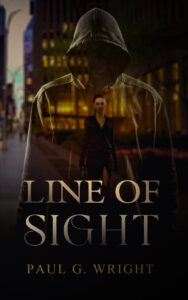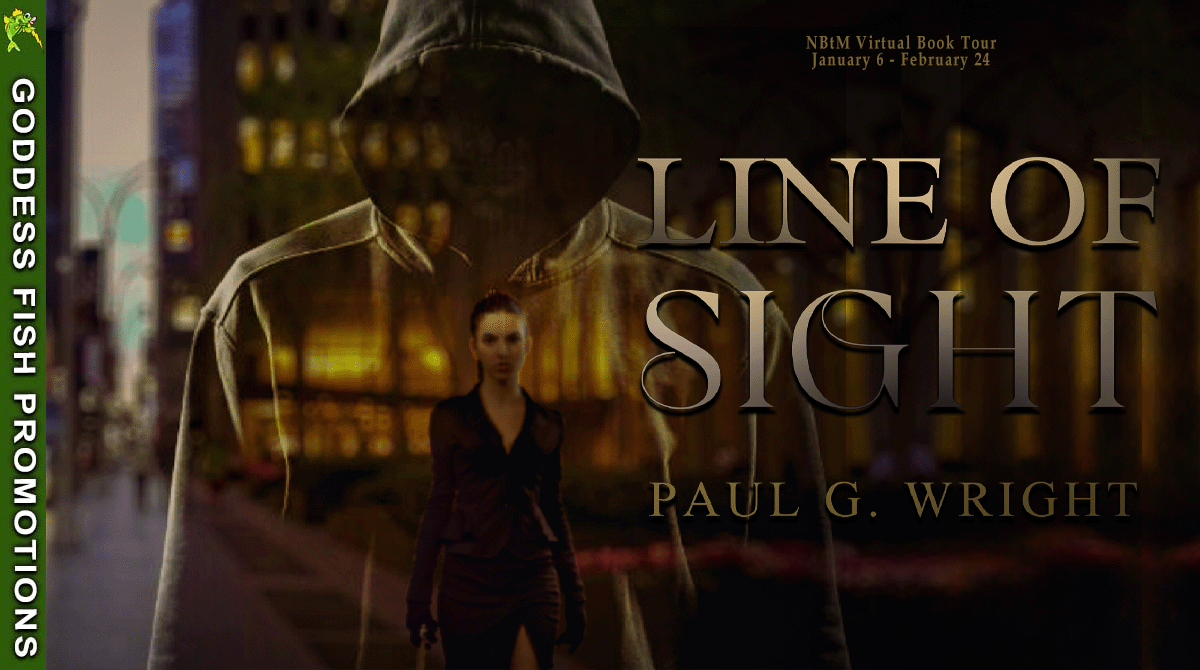Thriller author Paul G. Wright chats with me today about his new action thriller, Line of Sight.

During his virtual book tour, Paul will be giving away a $15 Amazon or Barnes and Noble (winner’s choice) gift card to a lucky randomly drawn participant. To be entered for a chance to win, use the form below. To increase your chances of winning, feel free to visit his other tour stops and enter there, too!
Bio:
Paul G. Wright is an author whose writing is shaped by a lifetime of diverse influences and personal experience. Growing up as a high school outsider, he found solace in books and heavy metal music, with authors like S.E. Hinton inspiring his admiration for strong, complex female characters. Later, his own real-life struggles as an artist and in matters of love gave him a deeper well of insight for his stories.
A lifelong fan of classic spy and mystery tales, Paul brings a unique perspective to his writing, influenced by friendships with military and law enforcement professionals. His ability to blend suspense, emotion, and authenticity makes him the ideal author for his latest novel, Line of Sight.
In addition to his writing, Paul has worked as a reporter for the “Rockdale Neighbor” newspaper and as a member of the Warehouse Actors Theater in Atlanta, where he wrote and contributed original material. He holds a bachelor’s degree in cinema from Columbia College Hollywood and is a member of PRSA. In 2020, he self-published his debut novel, A College Story, available on his website: paulgwright.com.
Paul has also been featured in interviews, including a conversation with Jasmine Wonders and R.J. Rome on “Married to My Writing” (April 2021). He currently lives in Atlanta, GA, where he works in communications and is hard at work on his next novel.
Welcome, Paul. Please tell us about your current release.
My latest novel, Line of Sight, is a fast-paced thriller set in 1995, following the exploits of intelligence operative Lora Chandler, better known as Agent Vogel. The story begins when she’s tasked with investigating an invisibility formula created by a college professor in the small Florida town of Lancaster. She soon finds herself drawn into a high-stakes conspiracy orchestrated by a shadowy organization called ION, whose goal is to use the technology to destabilize world governments by assassinating prominent leaders.
The mission becomes deeply personal when Vogel is reunited with her estranged love, reporter Richard Davis, forcing her to confront her past. As secrets unravel, Vogel must forge unlikely alliances—including one with her nemesis, Mason—and face impossible choices between duty and the people she loves.
With danger at every turn, “Line of Sight” explores themes of loyalty, sacrifice, and resilience in the face of overwhelming odds. It’s a story about the lengths we go to protect what matters most, set against a backdrop of espionage, suspense, and intrigue. Readers who enjoy classic spy tales mixed with emotional depth will find themselves right at home.
What inspired you to write this book?
The inspiration for Line of Sight comes from several places, but I’d say the idea itself was born one night while I was watching a movie with my dad. He’s a huge James Bond fan, and we were in the den looking at “GoldenEye,” starring Pierce Brosnan. As the film played, it struck me that doing a story in this genre would be fun, and that I’d never seen a spy movie or read a spy novel with a female lead. That seemed odd, especially as we were well into the 2000s. I was looking for my next writing project, and this seemed like an exciting challenge.
The second spark came from crafting the main character. Almost immediately, I knew who I’d base my spy on: a close female friend I’ve known since high school. She’s witty, charming, and tough as nails. The kind of woman who could flatter a diplomat at a State Dinner one minute and leap from a cockpit to disarm a bomb the next. If there was ever a candidate for a female intelligence agent, it was her.
I chose to set the story in the mid-90s to make it more challenging for my characters. At that time, cell phones weren’t the go-to solution for every problem, and the Internet was still in its early stages. There’s also a touch of nostalgia for me; my friend and I were young and single then, and much of the banter between Vogel and Richard Davis is based on our friendship.
I recognize that female-led spy stories are becoming more common, and I’m thrilled to see this shift. There are countless strong, capable, and complex women working in the real intelligence community, and with Line of Sight, I hope to showcase their contributions in the world of fiction.
Excerpt from Line of Sight:
Malachai began walking around the desk, making his way to where she stood. “I trust you have the information?”
“If you mean the disc with the professor’s notes, then yes.”
“Wonderful! This should solve things nicely. Blackmarr is a talented man, but he does have his flaws.” He held out a hand to Vogel. “May I have it, please?”
She paused. “And if I say ‘no’?”
Malachai winced. “Yes, well, that would be rather unfortunate. Let’s keep things on a pleasant note, shall we?”
Vogel removed the disc from her inside coat pocket. She handed it to Malachai, who immediately smiled. “Thank you so much. The poor man is convinced I’m going to kill him. This will ease his mind considerably.”
Another signal was given, and the door opened a third time. The butler returned and strode across the carpet. “See that this is delivered to the professor at once, please,” Malachai said, passing him the disc.
“Yes sir.” He accepted it in a white-gloved hand and swiftly exited.
Vogel watched and furrowed her brow. Her instincts told her that some sort of wireless technology was being employed to signal the servants. But she’d be damned if she could figure out what it was.
“Now, where was I?” said Malachai.
“You were explaining who you represent and how you intend to use the professor’s invention to save the world,” said Vogel. “Or words to that effect.”
The corners of Malachai’s beard turned up and he drew on his cigar, exhaling a long plume of smoke. “I suppose it does sound farfetched. But we aren’t doing anything that shouldn’t have been done long ago.”
“And just who are we, Mr. Malachai? You keep dodging the question.”
Malachai shifted his weight. “Why don’t we sit down?” he said, leading her to a pair of overstuffed chairs. “Let’s say we’re a network of sorts,” he said, folding himself into one. “A cooperative of well-placed individuals who feel there’s a better way.”
Vogel sat down opposite him. “And what is this better way?”
“For starters, the removal of boundaries and the eliminating of unnecessary burdens.”
“Such as?”
“Lines on a map, for example.”
“You mean countries.”
Malachai smiled. “Names mankind has invented. They don’t exist in any real sense. The Internet is already erasing these invisible barriers.”
Vogel was growing irritable. This was taking too long, and she wanted a cigarette. Leaning forward in her chair she locked eyes with the heavyset man. “Malachai, I am, by nature, blunt. I think this conversation might go better if you kept that in mind. Now, why don’t you tell me just what in the hell you’re proposing?”
Malachai removed the cigar from his mouth. He was silent for a moment and when he spoke again his face was darker. “Very well,” he said. “The people of the earth need help. Food is hoarded on one side while starvation takes place on the other. Money and education are wasted by the privileged while others live in ignorance and squalor. Governments do nothing but argue and make war. We intend to abolish this way of thinking and implement a new system.”
“What kind of system?”
“An empire.”
Vogel’s eyes grew wider. “With you as the emperor, I suppose?”
He nodded. “Precisely.”
Vogel’s breath hitched, a cold shiver running down her spine as her heart raced. He’s crazy, she thought. Mad as a hatter. This was the stuff of comic books and Saturday morning cartoons. And yet there he was, in full color, actually saying it—and worse, believing it. She didn’t know whether to laugh or call for a straitjacket. “And just how do you intend to institute something like that?”
His eyes were fixated on her. “Something will happen that will get the attention of the world. Like a star falling from the heavens. After this, there will be an announcement made at the Conference of Nations. It won’t be taken seriously. Then a certain world leader will be eliminated, throwing that country into chaos. Another will follow, and perhaps another. The pattern will continue until an emergency meeting is called, at which time, another announcement will be made. More forcefully. By then, the conference will have no choice but to concede.”
“And why is that?” Vogel said. She suspected she already knew the answer.
“Because Miss Chandler. One cannot defeat one’s opponent if one cannot see them.”
What exciting project are you working on next?
I’m currently working on the sequel to Line of Sight. Without giving too much away, the next installment delves deeper into the lives of several key characters, uncovering their backstories and exploring their evolving relationships. A new and formidable threat emerges, forcing the characters to confront challenges that will test their limits in unexpected ways. Along the way, readers will also meet some intriguing new faces who bring their own complexities to the story. I’m excited to continue expanding this world and keeping readers on the edge of their seats.
When did you first consider yourself a writer?
I’d known I wanted to write ever since I first read Judy Blume’s Tales of a Fourth Grade Nothing in grade school. I connected with the book, and it was the first time I realized the magic of storytelling and how words could create entire worlds.

While that book sparked my love of writing, the moment I truly felt like a writer came years later, when I first saw my name in print as a newspaper reporter. Growing up, my father worked as a reporter for the Atlanta Journal, and I was used to seeing his byline. When my own byline finally appeared, it was a huge validation. I was writing, being paid for it, and sharing my words with an audience. In that moment, I knew I was a real writer.
Do you write full-time? If so, what’s your workday like? If not, what do you do other than write and how do you find time to write?
Like many authors, writing is a second job. I work for a private company Monday through Friday, and after a full day’s work, the challenge is finding the energy to spend several more hours at my computer. The hard part is always getting started. Making that transition from thinking about the idea to putting words on the page. I usually begin after dinner, while my wife is working on her own projects. That first week is always tough, because you’re establishing a new habit. However, once I’ve written chapter one, my mindset shifts and the work begins to feel real. By then, the characters have started developing their own voices and personalities, and I can feel the horizon of the story spreading out before me. That’s when the fun begins. I get excited, waiting to see where it will take me.
What would you say is your interesting writing quirk?
I’d say my most interesting writing quirk is that every piece I write must have a theme song. A song or piece of music that captures the spirit of the story I’m creating. It’s a fun habit, but one I can’t bypass. Each time I start a new project, the first thing I do is scroll through my music library, searching for a song that clicks with the idea. This process can take time, but when I find the right one, I instinctively know it. From then on, I listen to it at the beginning of every writing session to help me immerse myself in the fictional world.
The theme song for Line of Sight was “Vasoline” by Stone Temple Pilots. For my first novel, A College Story, it was “Draggin’ the Line” by Tommy James & The Shondells. I’m still not sure why that worked, but it did. For another piece, “Werewolves of London” by Warren Zevon was the ideal match. Sometimes, individual characters develop their own theme songs. In “Line of Sight,” the character Shade became so central to the story that Metallica’s cover of “Breadfan” attached itself to her during my writing sessions.
The process doesn’t always work in reverse, though. For years, I’ve been trying to write a story tied to Metallica’s “No Remorse” from their “Kill ’Em All” album. It’s meant to be a fictional reflection on my high school days as an ’80s headbanger, and I have a folder of notes and sketches for it. The idea is there, and every time I play the song, I see flashes of images and hear voices calling to me. To date, the magic spark hasn’t struck. But I know it’s only a matter of time.
As a child, what did you want to be when you grew up?
When I was young, I dreamed of becoming a newspaper reporter, just like my father. Some of my earliest memories are of Dad sitting at the typewriter, carefully flipping through his reporter’s notebook, or heading off to work in a coat and tie with his briefcase in hand. Occasionally, I’d see his name next to a front-page story in the newspaper and think he must have the most important job in the world. Those moments left a lasting impression, and by the time I was in third grade, I knew I wanted to follow in his footsteps.
Anything additional you want to share with the readers?
I often get asked, “How do you get your ideas? What’s your secret? How do you manage to get all those words down?” Most people are searching for what I was looking for when I started out—the magical technique or hidden wisdom that successful writers have discovered. The truth is, there isn’t one. The old saying still holds: “Writing is ten percent inspiration and ninety percent perspiration.”
There’s a romantic image of the writer sitting at their desk, waiting for inspiration to strike, then pouring out page after page of brilliance in one fevered night. But it doesn’t work that way. Writing is a job, and like any job, it requires showing up and doing the work, even when you don’t feel like it. Talent is helpful, but discipline and persistence matter more.
So, to anyone trying to figure out how to start, my advice is simple: write. Don’t wait for inspiration, and don’t be afraid of imperfection. The more you write, the better you’ll get. And eventually, you’ll find that the rewards of creating something uniquely yours are worth the effort.
Links:
Website | Instagram | Amazon Author page | Amazon buy link

